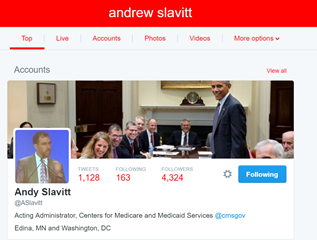CMS Administrator Goes to Twitter to Explain the Proposed Rule for the Medicare Access and CHIP Reauthorization (MACRA)
In an very unusual move for a government regulator, the CMS acting administrator Andy Slavitt took to Twitter to explain his agency’s strategy around the new Medicare payment law, also known as MACRA. This comes as CMS released the long-awaited proposed MACRA rule which is open for comment until June 27. The proposed rule creates a “Quality Payment Program” to replace old reporting programs. There two tracks, the first called the Merit-based Incentive Payment System (MIPS) consolidates components of the Physician Quality Reporting System (PQRS), the Value-based Payment Modifier (VM), and the Medicare Electronic Health Record (EHR) Incentive Program. A second track involves alternative payment models (APM). Because of the high bar set to qualify for the APM track, CMS projects that only 30,000 to 90,000 clinicians will be in the APM track. An estimated 687,000 to 746,000 physicians will be in MIPS.
Here are the highlights from Slavitt’s tweet-storm:
1- Today I will summarize how much listening we’ve been doing around #MACRA & lay out the opportunities to hear the basics & get engaged.
2. Our goal is to close the gap between Washington DC and front line realities of patient care. In May, we have over 35 events on #MACRA.
3. We’ve hosted ten #MACRA webinars this month with over 30,000 attendees.
4. To join one of our five upcoming #MACRA webinars, visit:https://www.cms.gov/Medicare/Quality-Initiatives-Patient-Assessment-Instruments/Value-Based-Programs/MACRA-MIPS-and-APMs/Quality-Payment-Program-Events.html …
5. We’re hosting #MACRA listening sessions. We’ve visited specialties, PC, & rural. You can invite #CMS to eventshttps://www.cms.gov/Medicare/Quality-Initiatives-Patient-Assessment-Instruments/Value-Based-Programs/MACRA-MIPS-and-APMs/Speaking-Engagement-Criteria.html …
6. With each event, we take common Qs & answer them through fact sheets. Our latest is on #MACRA & small practices:https://www.cms.gov/Medicare/Quality-Initiatives-Patient-Assessment-Instruments/Value-Based-Programs/MACRA-MIPS-and-APMs/Small-Practices-Fact-Sheet.pdf …
7. We post new content each week. Join the #CMS #MACRAlistserv to keep up-to-date: https://public-dc2.govdelivery.com/accounts/USCMS/subscriber/new?topic_id=USCMS_12196 …3:11 PM – 21 May 2016
8. Or you can visit our #MACRA website to learn the latest: http://go.cms.gov/QualityPaymentProgram …
He continued the next day:
Today, I will lay out some of the top interest & feedback areas we have heard for the Quality Payment Program under#MACRA.
1. One area of input is the need to use #MACRA to increase focus on practice of medicine/pt care, not reporting/measurement & paperwork.
2. A 2nd area is how small practices will fare relative to larger sized practices under #MACRA. We put this out:https://www.cms.gov/Medicare/Quality-Initiatives-Patient-Assessment-Instruments/Value-Based-Programs/MACRA-MIPS-and-APMs/Small-Practices-Fact-Sheet.pdf …
3. A 3rd area is the availability of payment models like med homes, ACOs, including how they overlap & how to ease the path in to qualify.
4. We have received other questions around flexibility, burden, timing, specialty care & payment adjustments.
5. Will create fact sheets 4 key questions as we answer them as we’ve been doing.
6. My takeaways: first, very encouraged by all the engagement, particularly the critics.
7. My takeaways: Second, people want a philosophical change- a program that doesn’t get in the way of practicing medicine, but supports it.
8. My takeaways: third, walking thru basics has been critical. Payment adjusts., measurement, paperwork r all better than today’s Medicare.
9. My takeaways: fourth, more time, more to learn, more#MACRA meetings coming up. 35 in May alone. Grateful for all the engagement.
Comment
Stakeholders have been struggling with the rule’s complexity and length, so it is not surprising that CMS wants to explore all possible avenues for communication. It is unlikely these tweets will do much to change the confusion and challenges facing physicians, but it is laudable that the government is thinking outside of the box and looking to connect over social media. But the biggest takeaway seems to be that CMS recognizes the complexity of the rule and this could be insight into the possible comments that should be sent to the agency. 60 days to analyze one of the most important Medicare regulations in a quarter century is simply not sufficient. CMS is bound by difficult congressional deadlines, but it may be smart for all of Washington, D.C. to rethink the MACRA implementation process. It is too important for physicians and patients alike to rush through massive changes that almost no physician truly understands.

